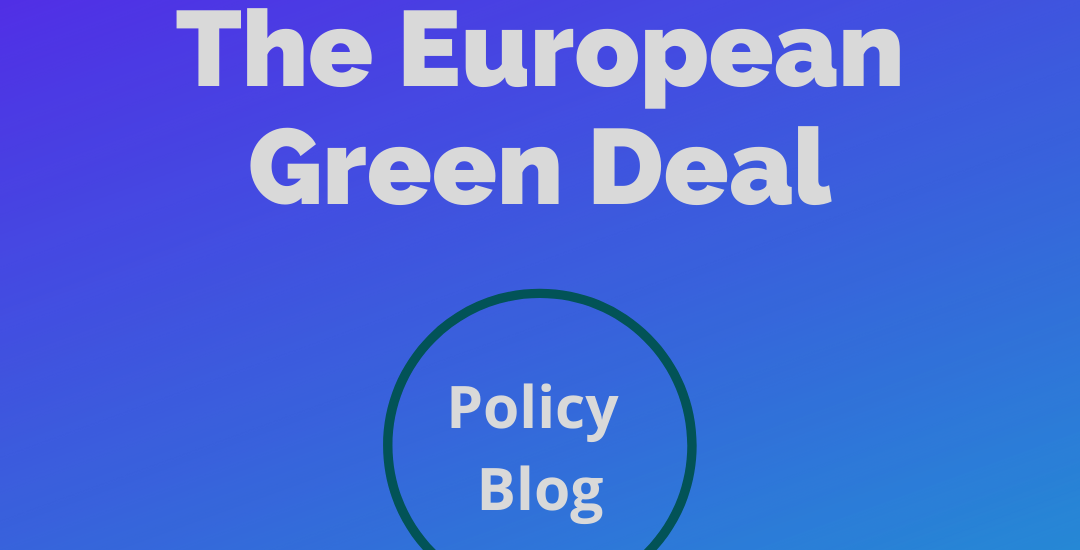- September 25, 2020
- Posted by: EARSC
- Categories: Blogs, EARSC News

As the expression of the European Union’s climate action plan, the European Green Deal is set to transform the EU’s economy for a sustainable future. The European Commission aims to mobilize at least a trillion euros over the next decade in order to encourage environmentally-related investments and stimulate innovation and research to make Europe the first climate- neutral continent by 2050. Even if the Covid crisis has put the political focus on the environment at risk, the European Union has confirmed that the Green Deal would remain a priority and would be at the heart of the economic recovery.
So why is the Green Deal relevant for the EO services industry and what are the concrete opportunities offered by the new EU’s growth plan?
First of all, it makes no doubt that space and Earth Observation in particular can contribute significantly to the objectives of the European Green Deal. The ambitious goals for the environment and a low-carbon economy call for advanced and innovative capacities and services to monitor, analyse, predict and mitigate the impact of the human activity on natural resources (soil, air, water…). We know that Earth observation data, combined with in-situ data and other sets of non-satellite based data, has become an essential operational instrument to monitor the evolutions of the environment and measure progress towards the goals set by the Green Deal and the UN 2030 Agenda for Sustainable Development. It is important to keep raising awareness of the many services offered by EO data and services; in that regard, the Green Deal should be an opportunity for the EO sector to play a more significant role and to demonstrate the added-value of EO data, especially for policy makers.
In the current context, two recent initiatives also reinforce the emerging opportunities of the Green Deal for our industry.
The European Union, through the Joint Research Centre (JRC) has launched the Destination Earth initiative[1]. This project aims to bring together the European scientific and industrial organizations and public stakeholders in order to build a digital twin of planet Earth. Institutions such as ESA will play an important role in the development of this project. The ultimate goal of this initiative is to create a platform, accessible for all, which will aggregate observation data with other models and data to know the current state of the environment and predict the future impacts of human activity on it. It would be a unique tool to give valuable insights for policy makers and industrial players. As building this capacity is critical for the achievement of the Green Deal’s objectives, the space industry will need support and an important part of the dedicated Green Deal’s budget will be useful, in particular the investments related to the development of advanced satellite-based products and services[2].
More recently, the 17th of September 2020, the European Commission has decided to launch a €1 billion call “for research and innovation projects that respond to the climate crisis and help protect Europe’s unique ecosystems and biodiversity”[3].The deadline for submissions is 26 January 2021, with selected projects expected to start in autumn 2021. A Horizon 2020 Green Deal Call Info Day & Brokerage event will also take place as part of the virtual European Research & Innovation Days that will take place from 22-24 September 2020.
The list of the 11 thematics and 20 subtopics of the Green Deal Call[4] are very promising for our industry. About 1 billion euros will be made available for Research and Development stakeholders willing to participate to the initiative by submitting their projects. The main thematics cover areas in which earth observation data and services can play a significant role: increasing climate ambition, clean, affordable and secure energy, sustainable and smart mobility, Farm to fork, zero pollution, toxic-free environment, transition towards a climate-neutral Europe…
By turning green challenges into business opportunities, it is certain that the European Green Deal should offer new opportunities for the EO services industry in the years to come… This is the reason why we will follow closely the evolutions of the Green Deal and keep you informed in the upcoming days and months!
[1] DestinE will start in 2021 and will be implemented gradually in the next seven to ten years.
[2] Anthropogenic emissions monitoring, air quality, water management, agriculture…
[3] https://ec.europa.eu/commission/presscorner/detail/en/ip_20_1669
[4] https://ec.europa.eu/info/research-and-innovation/strategy/european-green-deal/call_en
